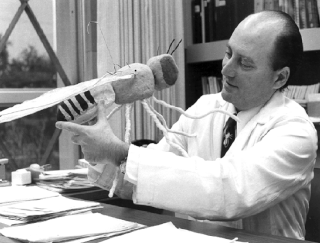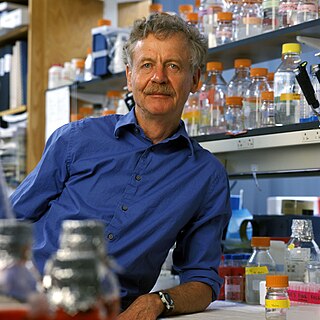Related Research Articles

David Baltimore is an American biologist, university administrator, and 1975 Nobel laureate in Physiology or Medicine. He is President Emeritus and Distinguished Professor of Biology at the California Institute of Technology (Caltech), where he served as president from 1997 to 2006. He also served as the director of the Joint Center for Translational Medicine, which joined Caltech and UCLA in a program to translate basic scientific discoveries into clinical realities. He also formerly served as president of Rockefeller University from 1990 to 1991, founder and director of the Whitehead Institute of Biomedical Research from 1982 to 1990, and was president of the American Association for the Advancement of Science in 2007.
Richard Charles Lewontin was an American evolutionary biologist, mathematician, geneticist, and social commentator. A leader in developing the mathematical basis of population genetics and evolutionary theory, he pioneered the application of techniques from molecular biology, such as gel electrophoresis, to questions of genetic variation and evolution.

Seymour Benzer was an American physicist, molecular biologist and behavioral geneticist. His career began during the molecular biology revolution of the 1950s, and he eventually rose to prominence in the fields of molecular and behavioral genetics. He led a productive genetics research lab both at Purdue University and as the James G. Boswell Professor of Neuroscience, Emeritus, at the California Institute of Technology.
Tak Wah Mak, is a Canadian medical researcher, geneticist, oncologist, and biochemist. He first became widely known for his discovery of the T-cell receptor in 1983 and pioneering work in the genetics of immunology. In 1995, Mak published a landmark paper on the discovery of the function of the immune checkpoint protein CTLA-4, thus opening the path for immunotherapy/checkpoint inhibitors as a means of cancer treatment. Mak is also the founder of Agios Pharmaceuticals, whose lead compound, IDHIFA®, was approved by the FDA for acute myeloid leukemia in August 2017, becoming the first drug specifically targeting cancer metabolism to be used for cancer treatment. He has worked in a variety of areas including biochemistry, immunology, and cancer genetics.

George McDonald Church is an American geneticist, molecular engineer, chemist, and a serial entrepreneur who is widely regarded as the "Founding Father of Genomics", and a pioneer in personal genomics and synthetic biology. He is the Robert Winthrop Professor of Genetics at Harvard Medical School, Professor of Health Sciences and Technology at Harvard University and Massachusetts Institute of Technology, and a founding member of the Wyss Institute for Biologically Inspired Engineering at Harvard. Through his Harvard lab Church has co-founded around 50 biotech companies pushing the boundaries of innovation in the world of life sciences and making his lab as the hotbed of biotech startup activity in Boston. In 2018, the Church lab at Harvard made a record by spinning off 16 biotech companies in one year. The Church lab works on research projects that are distributed in diverse areas of modern biology like developmental biology, neurobiology, info processing, medical genetics, genomics, gene therapy, diagnostics, chemistry & bioengineering, space biology & space genetics, and ecosystem. Research and technology developments at the Church lab have impacted or made direct contributions to nearly all "next-generation sequencing (NGS)" methods and companies. In 2017, Time magazine listed him in Time 100, the list of 100 most influential people in the world. In 2022, he was featured among the most influential people in biopharma by Fierce Pharma, and was listed among the top 8 famous geneticists of all time in human history. As of January 2023, Church serves as a member of the Bulletin of the Atomic Scientists' Board of Sponsors, established by Albert Einstein.

Oliver Smithies was a British-American geneticist and physical biochemist. He is known for introducing starch as a medium for gel electrophoresis in 1955, and for the discovery, simultaneously with Mario Capecchi and Martin Evans, of the technique of homologous recombination of transgenic DNA with genomic DNA, a much more reliable method of altering animal genomes than previously used, and the technique behind gene targeting and knockout mice. He received the Nobel Prize in Physiology or Medicine in 2007 for his genetics work.

Rudolf Jaenisch is a Professor of Biology at MIT and a founding member of the Whitehead Institute for Biomedical Research. He is a pioneer of transgenic science, in which an animal’s genetic makeup is altered. Jaenisch has focused on creating genetically modified mice to study cancer and neurological diseases.
Kevin Eggan is a Professor of Stem Cell and Regenerative Biology at Harvard University, known for his work in stem cell research, and as a spokesperson for stem cell research in the United States. He was a 2006 recipient of a MacArthur Fellowship. In 2005, he was named to the MIT Technology Review TR35 as one of the top 35 innovators in the world under the age of 35.

Bruce Alan Beutler is an American immunologist and geneticist. Together with Jules A. Hoffmann, he received one-half of the 2011 Nobel Prize in Physiology or Medicine, for "their discoveries concerning the activation of innate immunity".
Rudi Balling is a German geneticist. He is the founding director of the Luxembourg Centre for Systems Biomedicine at the University of Luxembourg (2009-2021) He has served as President of the International Mammalian Genome Society and as co-editor of the Annual Review of Nutrition since 2018. In 2016 Balling received Luxembourg's Ordre de Mérite (Commandeur) from Prime Minister Xavier Bettel.

Joachim Wilhelm "Jo" Messing was a German-American biologist who was a professor of molecular biology and the fourth director of the Waksman Institute of Microbiology at Rutgers University.
Nicholas Gordon Martin is an Australian behavior geneticist who has published over 1300 peer-reviewed articles on topics including the heritability of religion and intelligence and medical disorders such as endometriosis. Martin is among the most cited medical scientists in the Southern Hemisphere, with a number of citation classics including "Genes, culture and personality: An empirical approach" that he co-authored with Lindon Eaves and Hans Eysenck, "Analysis of the p16 gene (CDKN2) as a candidate for the chromosome 9p melanoma susceptibility locus" (Nature, and "Genetic and environmental contributions to alcohol dependence risk in a national twin sample".
Joseph (Joe) Thornton is an American Biologist. He is a professor at the University of Chicago and a former Early Career Scientist of the Howard Hughes Medical Institute. He is known for resurrecting ancestral genes and tracing the mechanisms by which proteins evolve new functions.

Armin Falk is a German economist. He has held a chair at the University of Bonn since 2003.
Steve A. Kay is a British-born chronobiologist who mainly works in the United States. Dr. Kay has pioneered methods to monitor daily gene expression in real time and characterized circadian gene expression in plants, flies and mammals. In 2014, Steve Kay celebrated 25 years of successful chronobiology research at the Kaylab 25 Symposium, joined by over one hundred researchers with whom he had collaborated with or mentored. Dr. Kay, a member of the National Academy of Sciences, U.S.A., briefly served as president of The Scripps Research Institute. and is currently a professor at the University of Southern California. He also served on the Life Sciences jury for the Infosys Prize in 2011.
David Chaim Rubinsztein FRS FMedSci is the Deputy Director of the Cambridge Institute of Medical Research (CIMR), Professor of Molecular Neurogenetics at the University of Cambridge and a UK Dementia Research Institute Professor.
Nobuyo N. Maeda is a Japanese geneticist and medical researcher, who works on complex human diseases including atherosclerosis, diabetes and high blood pressure, and is particularly known for creating the first mouse model for atherosclerosis. Maeda has worked in the United States since 1978; as of 2017, she is the Robert H. Wagner Distinguished Professor at the University of North Carolina at Chapel Hill.

Jean-Louis Mandel, born in Strasbourg on February 12, 1946, is a French medical doctor and geneticist, and heads a research team at the Institute of Genetics and Molecular and Cellular Biology (IGBMC). He has been in charge of the genetic diagnosis laboratory at the University Hospitals of Strasbourg since 1992, as well as a professor at the Collège de France since 2003.
Richard Palmiter is a cellular biologist. He was born in Poughkeepsie, NY and later went on to earn a BA in Zoology from Duke University and a PhD in Biological Sciences from Stanford University. He is employed with the University of Washington where he is a professor of biochemistry and genome sciences. His current research involves developing a deeper understanding of Parkinson's disease. His most notable research is a collaboration with Dr. Ralph Brinster where they injected purified DNA into a single-cell mouse embryo, showing transmission of the genetic material to subsequent generations for the first time.

Masashi Yanagisawa is a Japanese molecular biologist and physician, famous for his discovery of the hormone endothelin and the neuropeptide orexin, the absence of which is the cause of narcolepsy. He is currently the Director of the International Institute for Integrative Sleep Medicine, University of Tsukuba, and an adjunct professor at the Department of Molecular genetics, University of Texas Southwestern Medical Center.